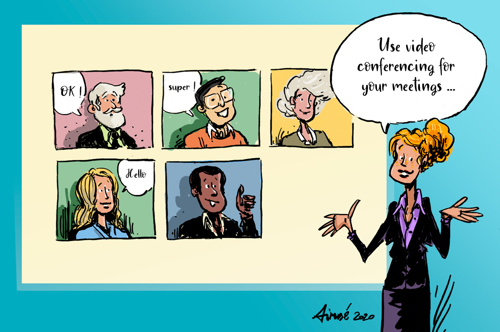- Corporate Law and M&A
- general meeting , digital meeting , management board decision , company , association , electronic means of communication
The coronavirus measures made the decision-making process of companies and associations already more flexible and introduced digital meetings.
These temporary measures now have become structural measures by virtue of the Covid-19 law, which makes it easier for companies and associations to hold their meetings remotely and/or virtual.
Since the introduction of the Code on Companies and Associations (henceforth WVV/CSA), it was already possible to stipulate in the articles of association that general meetings of a company could be held digital.
Due to the coronavirus measures, it was suddenly no longer possible to hold physical meetings, and in April 2020 a temporary relaxation was already granted regarding the conditions for holding digital meetings.
With the (Covid-19) law of 20 December 2020, these conditions are once again relaxed.
From now on, it is no longer required that the possibility of holding digital meetings is provided for in the articles of association. Since 1 January 2021, the management body of the company can decide to hold a digital general meeting anyway. These changes are part of the general digitisation policy initiated and led by the current Minister of Justice.
Below, we elaborate on the elements introduced by the Covid-19 law and how they have modified the legal framework in this context.
1. What does the Code on Companies and Associations provide?
The traditional way in which general meetings are organised is by physical gathering.
With the introduction of the WVV/CSA, which came into full force on 1 January 2020, the following alternatives to this classic way of organising general meetings have already been foreseen, namely without a physical meeting:
- A general meeting by electronic means of communication;
- A general meeting via written decision-making;
- A remote vote prior to the general meeting;
- The use of proxies by the shareholders.
But an important condition for the use of some of these alternatives was that the articles of association should allow such alternative way of decision making.
But, many companies have not yet updated their articles of association since the introduction of the WVV/CSA. This explains why, in practice, only a limited number of companies could make use of these alternatives.
The coronavirus measures, which made and still make traditional physical meetings impossible, have made the demand for alternatives a burning issue.

2. The temporary solution offered by a Royal Decree of 9 April 2020
Many companies and associations have a financial year that runs until 31 December.
This means that annual accounts and annual reports must be established by the management body and an annual shareholders’ meeting or members' meeting must be held within six months after the end of the financial year. Traditionally, therefore, many annual general meetings are held in the months of April, May and June.
Last year 2020, around that same period, we were faced with the so-called first "lockdown" and physical meetings were no longer possible.
Therefore, the government decided to grant some derogations relating to the meetings of the corporate bodies of companies and associations.
With the temporary relaxation, the obligation to have the possibility of a digital general meeting stipulated in advance in the articles of association was lifted.
Even if the articles of association had not provided for it, the general meeting could be held via electronic means of communication.
The management body was also given the power to impose a number of measures on the participants of a general meeting in connection with its conduct.
However, these measures were limited in time and could only be applied to meetings which had to be held or should have been held, or to notices which had to be sent or should have been sent between 1 March 2020 and 30 June 2020.
3. Structural measures: the Covid-19 law of 20 December 2020
In practice, even after the expiry of the temporary relaxation, Belgian companies and associations still experience difficulties in organising their general meetings.
Apart from the urgent and temporary corona measures, the Covid-19 law now provides for permanent structural measures regarding the digitalisation of the decision-making process of companies and associations. These measures entered into force on 24 December 2020.
What are they about?
3.1 A management board decision to hold a digital meeting is sufficient
From now on it is no longer required, that the articles of association explicitly provide for the possibility of holding a digital meeting.
It is henceforth possible to organise a digital general meeting even if such possibility is not provided for in the articles of association.
As from 24 December 2020, a mere decision of the management body to proceed with the organisation of a digital general meeting (remote meeting) will suffice.
Unlike the members of the management body and the statutory auditor, only the members of the general meeting's bureau are not allowed to participate remotely in a digital meeting. They have to be physically present since they are responsible for validating the composition of the general meeting via the digital channel and for its proper conduct, and they are responsible for signing the minutes.
Companies and associations must equip themselves with electronic means of communication for the organisation of a remote meeting which allow shareholders to participate in the deliberations and to ask questions.
If the companies and associations do not have such electronic means of communication, the management body must justify this in the notice convening the general meeting. This exception is temporary and applies until 30 June 2021.
The convocations must give a clear and precise description of the procedures to be followed for remote participation. If the company has a website, it must make this procedure accessible on its website to any shareholder participating in the meeting.
Companies and associations will have until 30 June 2021 to have an electronic means of communication that allows the organisation and holding of a digital general meeting.
This change is structural. This means that it will continue to exist even after the corona crisis.
3.2 The electronic means of communication must meet certain quality requirements
The WVV imposes a number of conditions on the organisation of a remote general meeting. In this way the legislator tries to safeguard the interests of the shareholders.
The electronic means of communication must make it possible to:
- verify the identity of the shareholder;
- take direct, simultaneous and uninterrupted (read: live) notice of the proceedings;
- exercise the voting right;
- ask questions and thus take an active part in the deliberations.
With regard to this last condition, which entails an effective exercise of the right to raise questions by the shareholders during the digital meeting, the Covid-19 law has allowed that, should it not be possible to comply with this condition, the management body can motivate why it is not possible at that time. This motivation must be included in the convocation notice. This possibility to deviate from the quality requirements is valid until 30 June 2021 and applies to BVs/SRLs, CVs/SCs, NVs/SAs and (I)VZWs/A(I)SBLs.
3.3 Additional possibilities for (International) Not for Profit Organisations ((I)VZWs/A(I)BLS
As explained above, the written decision-making procedure already applies to companies and will now also apply to (International) NPOs.
The written decision-making procedure is a great simplification for many NPOs. However, practical problems may arise, because the written decisions must be taken unanimously, which can be quite a challenge, especially for large associations with many members.
In addition, the Covid-19 law offers the possibility for NPOs and International NPOs to vote electronically before the general meeting, or to organise the general meetings digitally. However, it is required that the associations, like companies, are able to verify the capacity and identity of their members, in the manner determined by or pursuant to the articles of association. The preliminary vote can therefore only be held electronically if this is provided for and regulated in the articles of association.
4. Conclusion
The changes introduced by the Covid-19 law aim to eliminate the existing legal and statutory obstacles to holding virtual general shareholders' meetings and/or to allow remote participation. This possibility, which was already somewhat introduced during the first corona lockdown, is now permanent.
We are very pleased with this important structural change to the WVV/CSA, which is of great importance to any company or association.
If you have any further questions on this matter or if you would like assistance, please do not hesitate to contact us at info@seeds.law.





